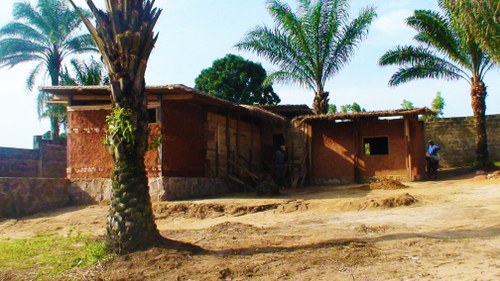RESEARCH PROJECT

A healthy, cheap and easy-to-build house for the inhabitants of the suburbs and the Kinshasa region, the capital of the Democratic Republic of the Congo. A project to be carried out using resources available in the field - from soil to wood to metal - respecting cultural and ecological balance and keeping costs low, with the will to restore dignity to the local population by guaranteeing the right to housing and better living conditions. The project is carried out by the Department of Civil, Chemical, Environmental and Materials Engineering of the University of Bologna.
Today Congo is the last country in the world in the Human Development Index, with a life expectancy at birth of 48.4%, with 71.3% of the population living below the national poverty line and a fertility rate of 5.5 children per woman. An inefficient public administration, lack of water and electricity, sexual promiscuity and above all poor sanitation are the problems that afflict a very poor country despite the presence of diamond mines, gold and coltan.
The design and construction of the new homes took place in the locality of Telecom Zamba, where Madre Maria Agnese Manzoni Foundation operates, in collaboration with the Somasche Sisters of Rapallo. The lack of internal air conditioning and sanitary needs are the main problems that the project has chosen to tackle, finding solutions that call into question the bioclimatic architecture.
The building prototype consists of four modules and was built with three different construction technologies. The common denominator of the different elements is the use of raw earth: an ideal material for its thermohygrometric qualities and therefore for the ability to generate environmental comfort.
Sheet metal roofs, which are very common in the construction of houses in the region, have been replaced by semi-regulating roofs, which offer greater protection from the sun and the sound of rain. To solve the hygienic problem, a toilet has been set up with adequate sanitary facilities. The prototype was made in self-construction with the help of people living near the Madre Maria Agnese Manzoni Foundation, mostly without technical training, using a traditional construction technology to which small changes were made to increase its performance.
This new economic and ecological house created through this project is called Maisonnette Boboto: a name that, combining a French term with a lingala, speaks of interculturality and respect for local traditions.
Collaborations:
Fondazione Maria Maria Agnese Manzoni, associated with various international institutions: A.R.E. Alliance for Rural Electrification, Brussels; Lighting Africa project, of the I.F.C. International Finance Corporation, New York; the I.W.A. International Water Association, The Hague; I.N.B.O. International Network of Basin Organizations, Paris; O.I.E.A.U. Office International de l'Eau, Paris; A.f.WA African Water Association, Abidjan; E.A.D.I. European Association of Development Research and Training Institutes, Bonn.